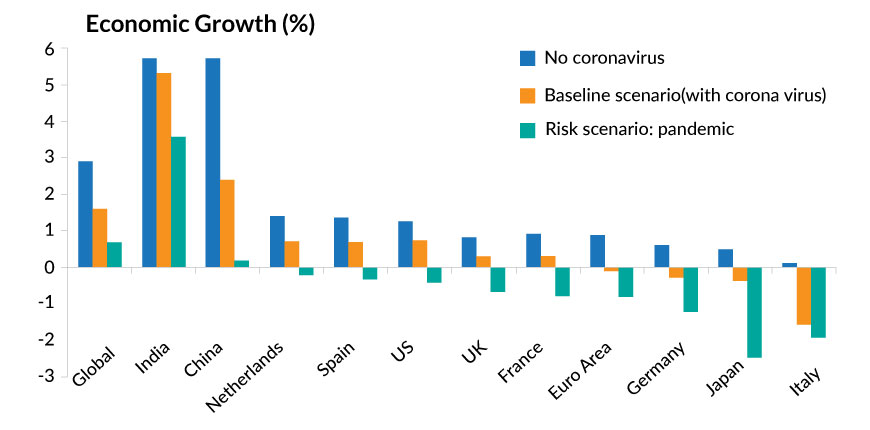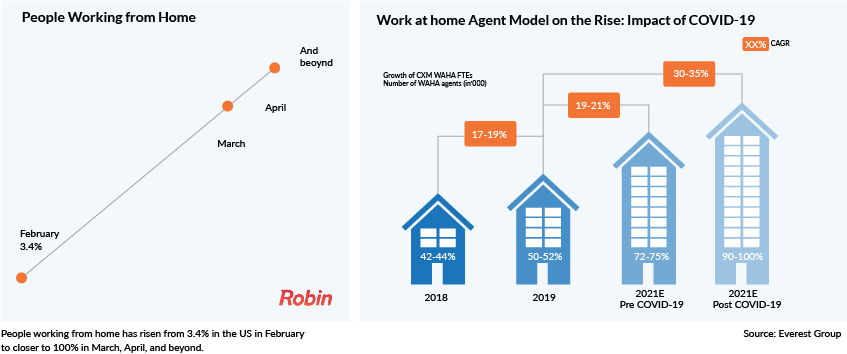Topics:
The Pandemic: How it’s Catalysing the Rise of the Future Workplace
Posted on May 27, 2020
Written By Pom Chakravarti

The rate at which CoVID-19 has driven businesses into ‘crisis mode’, demanding them to pivot their operations to ensure survival and longevity or face unfortunate closure, has highlighted a lack of preparedness. While most businesses were prepared with a BCP to enable continuity and endure crisis situations such as fire, earthquake, flood, and power disruption, none anticipated the severe impact of the coronavirus, bringing the world into lockdown and business operations to a standstill, requiring them to enable 100% WFH to simply continue.
Many business leaders, who earlier resisted the idea of homeworking practice, are now pushed to press the Work-From-Home (WFH) button.
“Around 2/3rd of the 4.3 million IT and BPO workforce in India has shifted towards WFH practice to keep the service running amidst the lockdown.”
The idea of outsourcing several business processes to third party offshore specialists is also being considered more seriously to combat the prevalent crisis.
Although businesses have started deploying these strategies, there are numerous challenges to overcome including lack of time for successful mobilisation, drafting and implementing new corporate policies and procedures that reflect and support ‘the new normal’ work practice. There are serious concerns around government compliances, connectivity, data security, lack of adequate hardware and infrastructure that obstructed the feasibility of implementation of remote work for numerous organisations.
The continued lockdown in most countries is posing unprecedented challenges to the global businesses, employment and the economy.
“These lockdown measures have affected around 2.7 billion workers; for your reference, this is 81% of the global workforce. The International Labour Organisation (ILO) expects 195 million job losses worldwide, 12 million losses in Europe, all this in Q2 of 2020.”
The 2008 financial crisis was a dry run compared to this one! – these are words of Kenneth S. Rogoff, a renowned Harvard Economist.

Source: RaboResearch, IMF, Macrobond
Governments are offering economic support to businesses and people. For instance, the US government passed a $2 trillion stimulus package.
However, businesses of all sizes, covering several sectors, are struggling to stay alive. So many people are being furloughed and getting laid off – all of them are facing alarming financial uncertainty.
3.3 million Americans submitted requests to avail unemployment benefits during the week closing on March 21. 6.9 million more people applied in the subsequent week, and 6.6 million more in the following week ending on April 4. These numbers are quite appalling!
This CoVID-19 pandemic is far from over, and we will be feeling its socioeconomic impact for years to come. The business landscape will forever be changed, and what was normal a few months back will not remain so anymore. This is a time to invent and invest in a ‘new normal’.
QX Business Continuity Plan (BCP) amidst the Coronavirus (CoVID-19) Pandemic
Right around February, QX had started following the guidelines set forth by the World Health Organisation (WHO) to ensure the safety of our employees:
- Workplaces cleaning regimes were stepped up a notch. Door handles, lift buttons, transportation seats repeatedly cleaned with disinfectants.
- Hand sanitisers were issued to all departments, and proper handwashing was promoted.
- Advisories concerning health, travel, social distancing and public gatherings were provided to the employees.
- Stay-at-home advice for employees feeling ill with the symptoms of the virus.
In March, as the number of cases started escalating, the BCP team started working on planning and implementing a new remote working setup that ensured employees’ safety without inhibiting the service delivery capability.
We gained consent from clients, coordinated with suppliers and the staff comprising of more than 1,300 members; subsequently implementing a new WFH policy prioritising critical processes. Team communication and reporting processes were redefined.
Effective March 23, 2020, the majority of our employees commenced operating from home, delivering services per client needs.
You can read all about the QX BCP plan here.
I understand that immediate action is necessary to get people back working, whether it’s a WFH setup or working in an office when the time is right.
To prevent this economic slump from escalating further, we, as business leaders and stakeholders, must quickly adapt to the new workplace normal – a new normal in which social distancing is a standard and mandated practice to follow at the workplace, a new normal in which flexible working hours and homeworking is part of the routine.

Organising & Enabling a Safe Return to Work
In the few countries where the peak of the pandemic may have passed, we see initiatives around reviving the local economy – helping people to get back to work and restarting commercial marketplaces. It is a careful, gradual process moderated by the government.
Returning to work, we will be dealing with a new workplace reality. New guidelines and protocols concerning health and safety will be mandated with an aim to support the employees as well as employers – Maintaining physical distance, practising extra hygiene measures, undergoing regular health checks and testing. No more handshakes; an “East-Asian Bow” or an “Indian Namaste” could be part of the standard etiquette to greet colleagues and clients worldwide.

Namaste- A new professional hello?
These solutions may as well be crucial for the foreseeable future.
I believe that the HR and Recruitment services providers, including the recruitment process support providers offering Global Shared Service Model, will have a significant role to play in organising and enabling a safe return to work, in line with government guidelines, and restart the economy.
“To give context to their reach, 160,000 agencies placed around 58 million people, in 2018 alone, in jobs spread out across several sectors and geographies. 2.4 million staff and consultants contributed to these placements.”
Recruitment service providers are seasoned experts when it comes to dealing with continually changing circumstances in the employment landscape. Helping clients and talents in the global employment market is their core business.
Working closely with employers and employees, covering most part of the world geography and diverse sectors; recruitment service providers are well acquainted with government and sector regulations, especially around compliance. Moreover, considering their overall reach as detailed earlier, they are well placed to share knowledge on the best practices around corporate approach towards employment laws, health and safety measures across all sectors and for across countries.
- They can assess, unlock and share new approaches based on the challenges of their active clients.
- They can assist employers in devising plans and drafting compliance regulations, helping them restart their business.
- Through their extensive global network and RPO partners, they can help employers connect with the right talents and quickly help them adapt to best practices for the ‘new normal’.
- They can deliver practical and scalable support pertaining to the talent supply, talent management, flexible working setup, training and performance management, and so much more.
These advisories and recommendations from the HR and recruitment services are informative and theoretical; it’s up to specific business owners and leaders, to implement them and help people get back to work and minimise the economic downturn caused by the coronavirus crisis.
Technology
As the business world wrestles with the effects and contemplates over the after-effects of the CoVID-19 pandemic, technology has been called in to save the day by businesses and governments worldwide.
Take a look back in time, and you see that in times of crisis, new opportunities, innovations come to the fore. These opportunities and innovations bring about complete changes in behaviours and working models that become the new normal post-crisis. Techs that have been in the waiting to go mainstream for a long time may finally get their chance and be immediately adopted as part of the new reality.
This pandemic may well be that final push which drives digital transformation to paint a new business and workplace normal.
Italy experienced an 80% hike in e-commerce in the two weeks after lockdown. As other major countries go into lockdown, the population will also move online. Add to this, the increased need to maintain social distancing, we should witness increased use of online and contactless payments.

Fintech firms may finally go mainstream, overtaking traditional banking and financial services, at an exponential rate. Blend, a US-based digital lending platform, was reporting $2 billion in consumer loans daily before the pandemic, is now processing up to $9 billions loans daily.
Blockchain technology might find this as an opportunity to come to the fore in the global supply chain market as well. Transparency and chain of custody are more important than ever, and that’s where blockchain comes in. Accounting businesses have always been investing substantial work hours and resources in validating and matching entries; this can be an opportunity for the industry to rapidly adopt technology and save time and reduce cost. Blockchain, in particular, can play a vital role in maintaining and securing the healthcare supply chain, catalysing the use of digital transactions, upending accounting and finance industry, and even containing the expansion of the coronavirus. Huawei, a tech giant, has been pushing the blockchain tech to combat coronavirus spread.
Organising & Enabling Work From Home
Pivoting operations to implement work from home (WFH) may look easy on paper but is far more challenging in reality.
- Employees may not have space at home that is conducive to remote work – lack of connectivity, workspace, and hardware are factors to consider.
- For employers, sourcing laptops, computers, furniture, or any other equipment that employees may require is difficult and an expensive investment.
- Then there are concerns around government compliance and regulations, performance, productivity, connectivity, and distractions around working from home.

However, this pandemic has forced the distributed workforce to come together and pushed them to leverage the tools and tech at their disposal to get the work done. Did you know that at present around 900 million people worldwide are working remotely? Tools such as Slack, Asana, Google Hangouts, Zoho, Microsoft Teams, Skype are being used extensively by businesses to facilitate team communication, project management, reporting, conferencing, presentations and more.

These tools aren’t brand new; they have been around for almost a decade. The pandemic pushed everyone to rediscover and adopt them!
And who would’ve known! Work is not just getting done – SLAs are smashed. The benefits around flexibility and reduced commuting have motivated the workforce, elevating their productivity and efficiency.
As we gradually identify and understand the true potential of WFH, we could very much be witnessing the onset of a new workplace. In this new reality, offices may become an antiquated concept or an occasional pitstop to greet and meet colleagues or perform administrative chores.
Closing Thoughts
The world will forever be changed with this pandemic. Few bits of this change are sad but inevitable.
Instead of pondering over what was; we must look at what we have and can be achieved and move ahead with time. Business visionaries will know that they need to pivot their operations, pivot their thought-process to thrive, and not just survive, in the new business reality.
Like these insights from our leaders? Join thousands of our followers by liking us on Facebook, or follow us on Twitter, and LinkedIn.
For more information contact us.
Pom Chakravarti
Pom Chakravarti is a management graduate with specialisation in marketing and finance. Over the course of the last 15 years at QX, he has grown from a service delivery operational role to a strategic position, where he works closely with the Group CEO and the QX Board to fine tune and achieve business objectives. As the CSO, Pom provides personalised consulting and advisory support to clients, ensuring that the business is able to effectively support the growth goals of its clientele.
Originally published May 27, 2020 12:05:37, updated Mar 10 2022
Topics:








